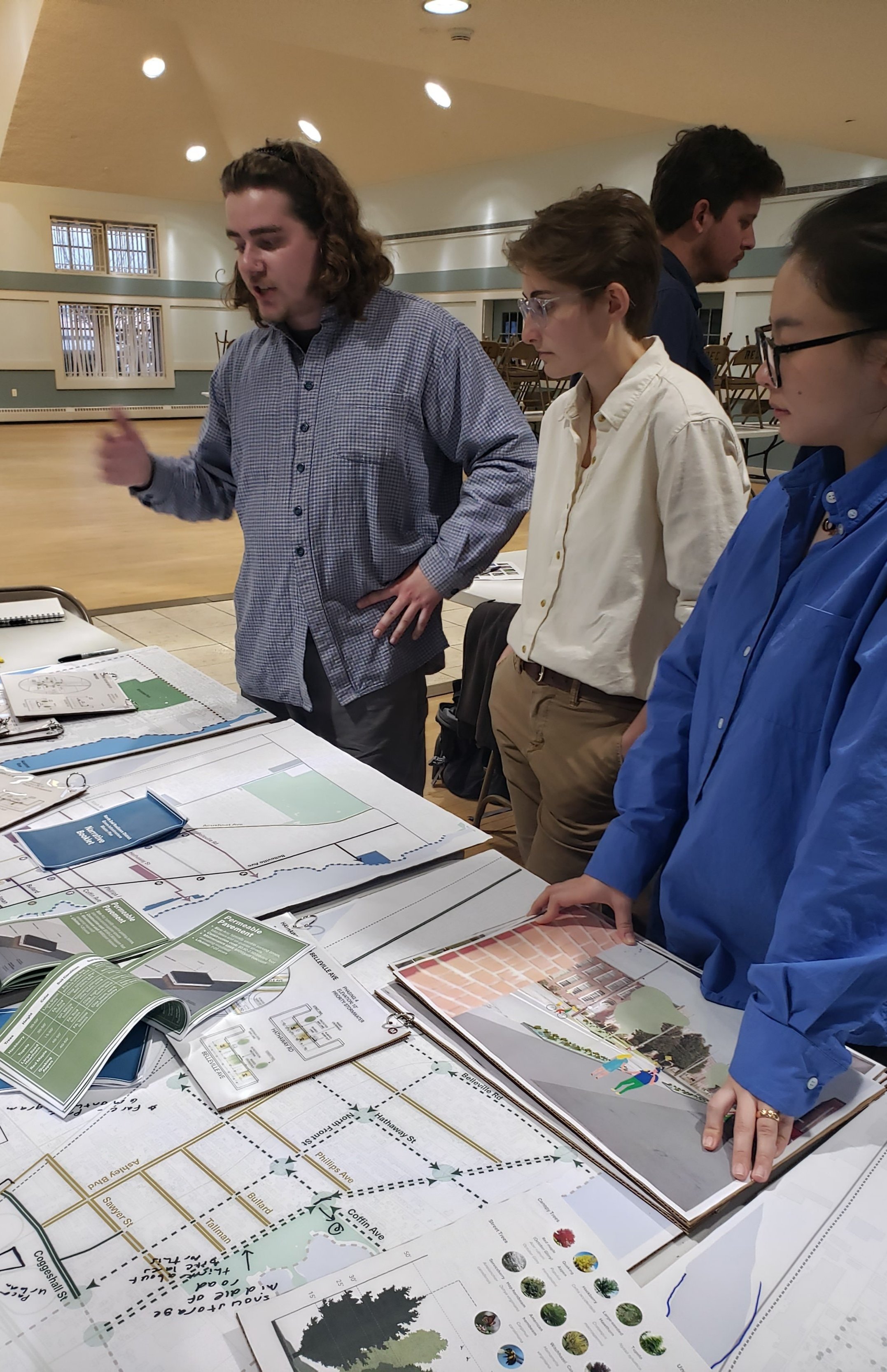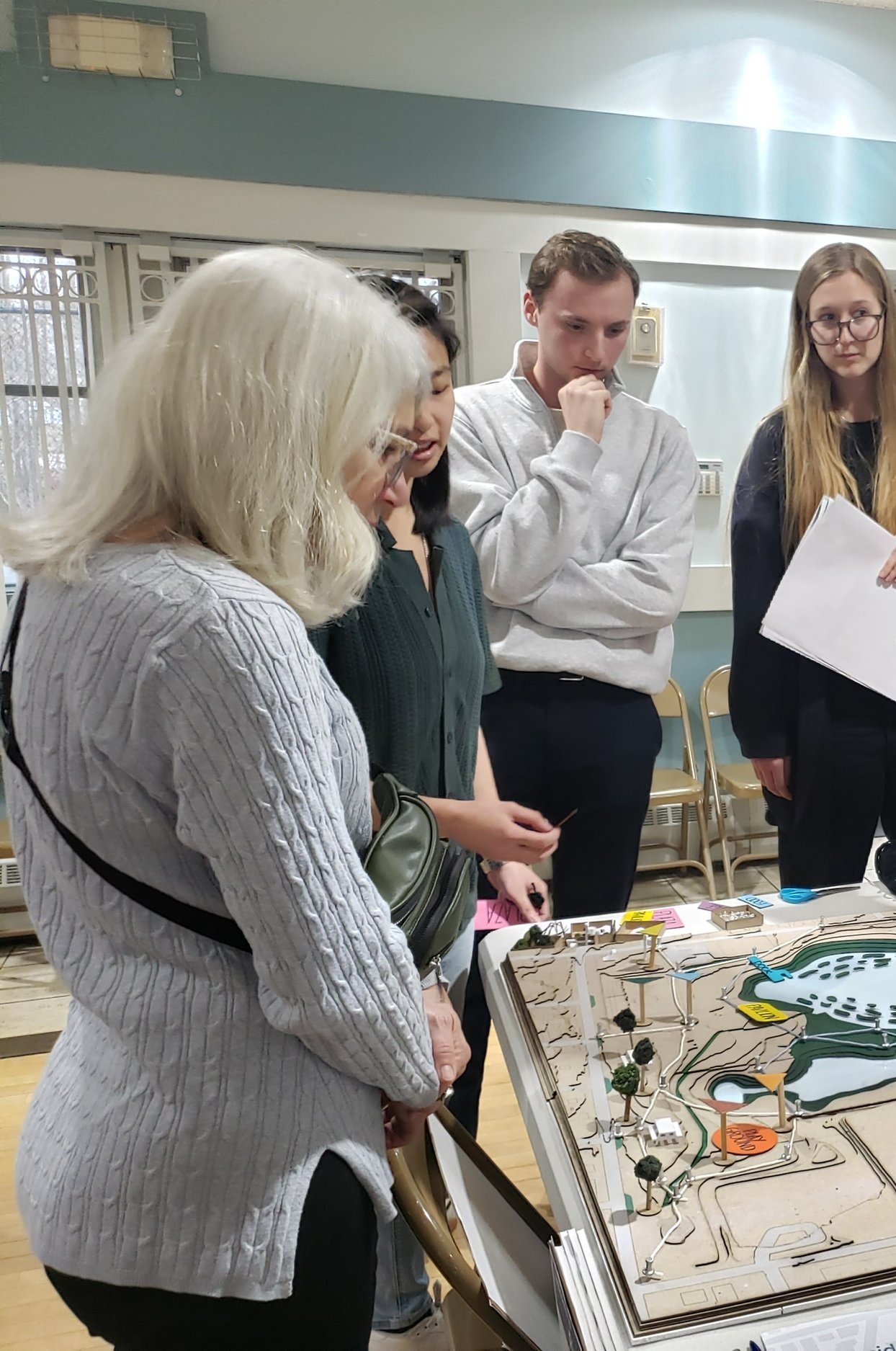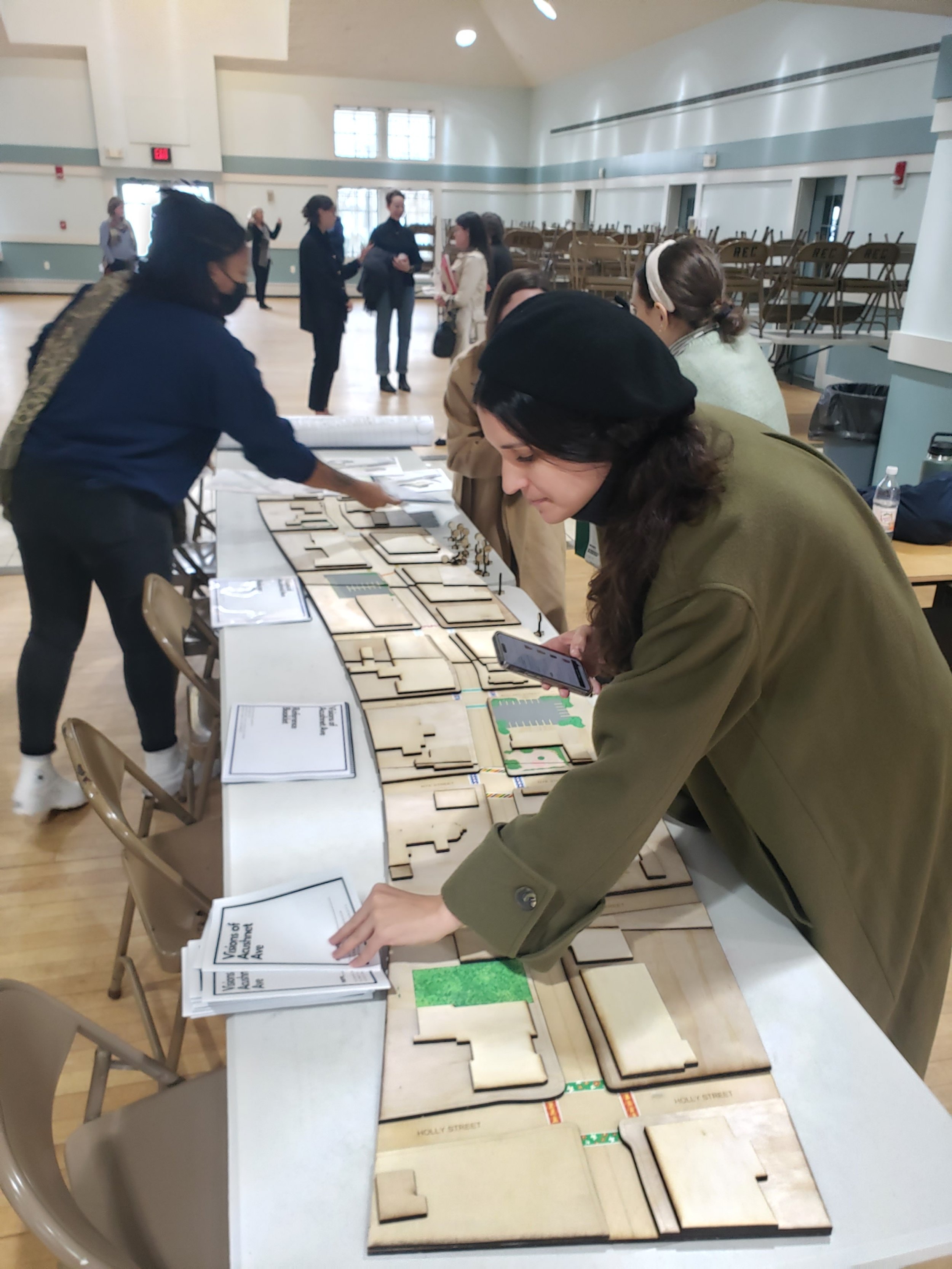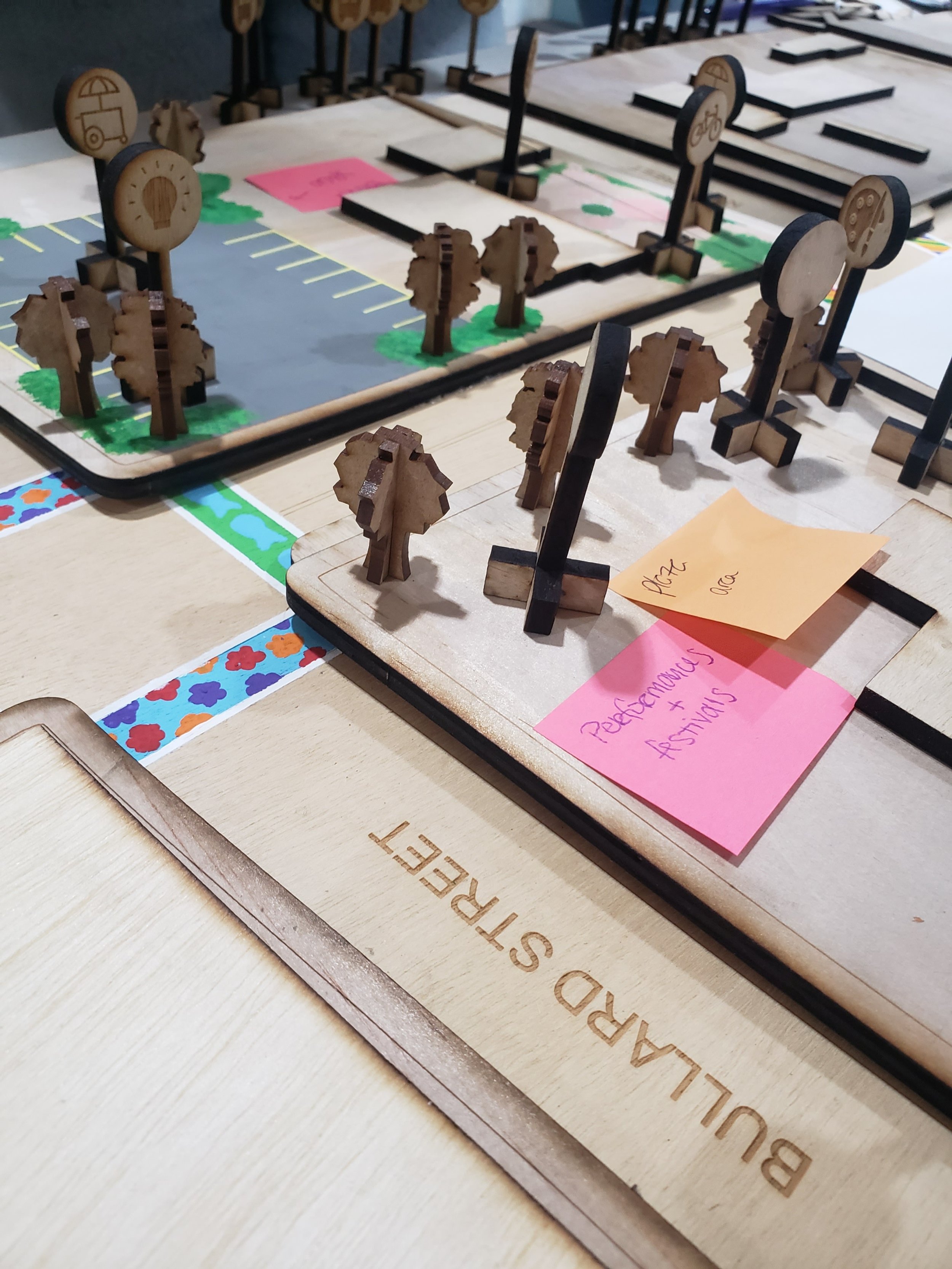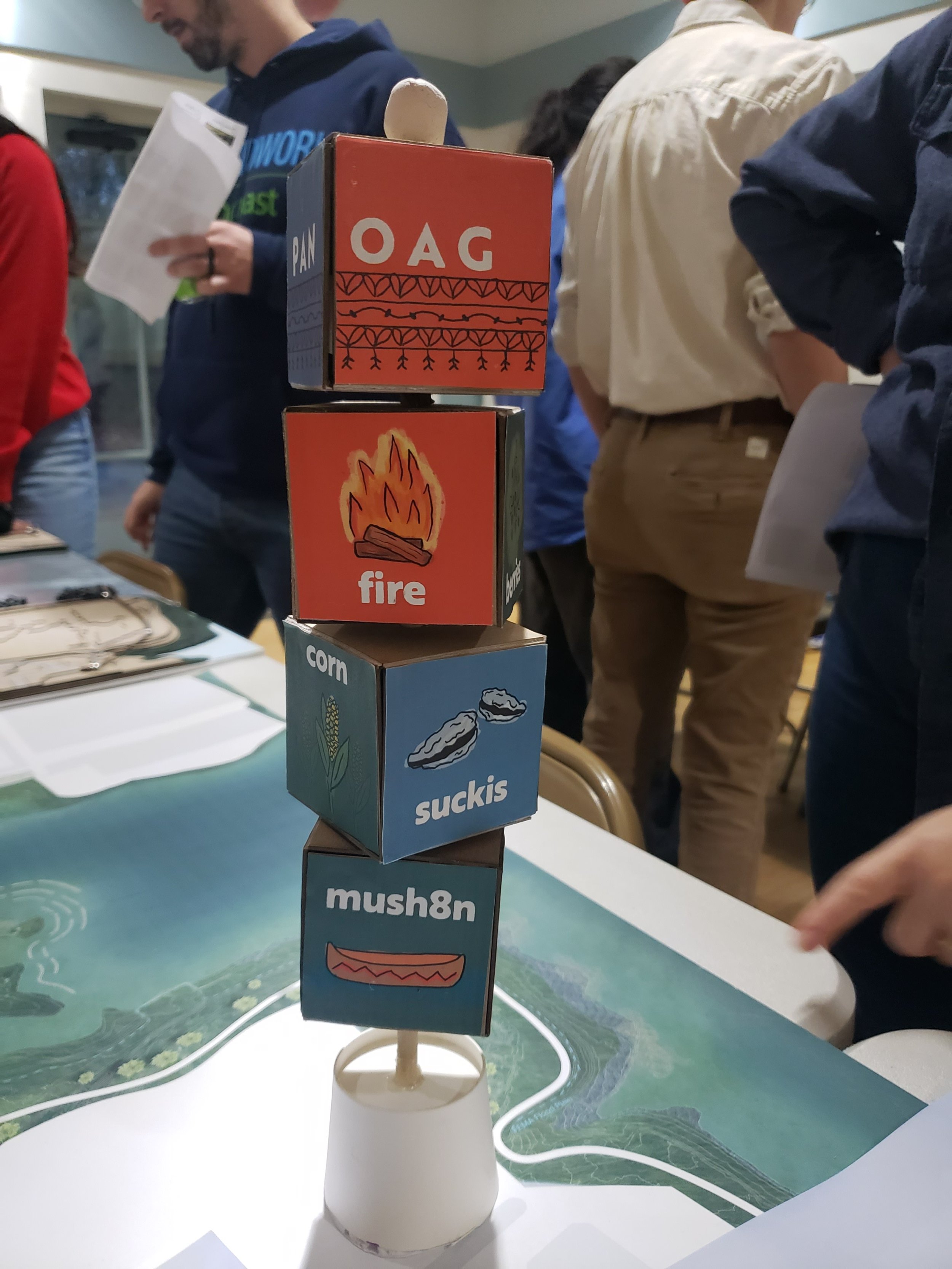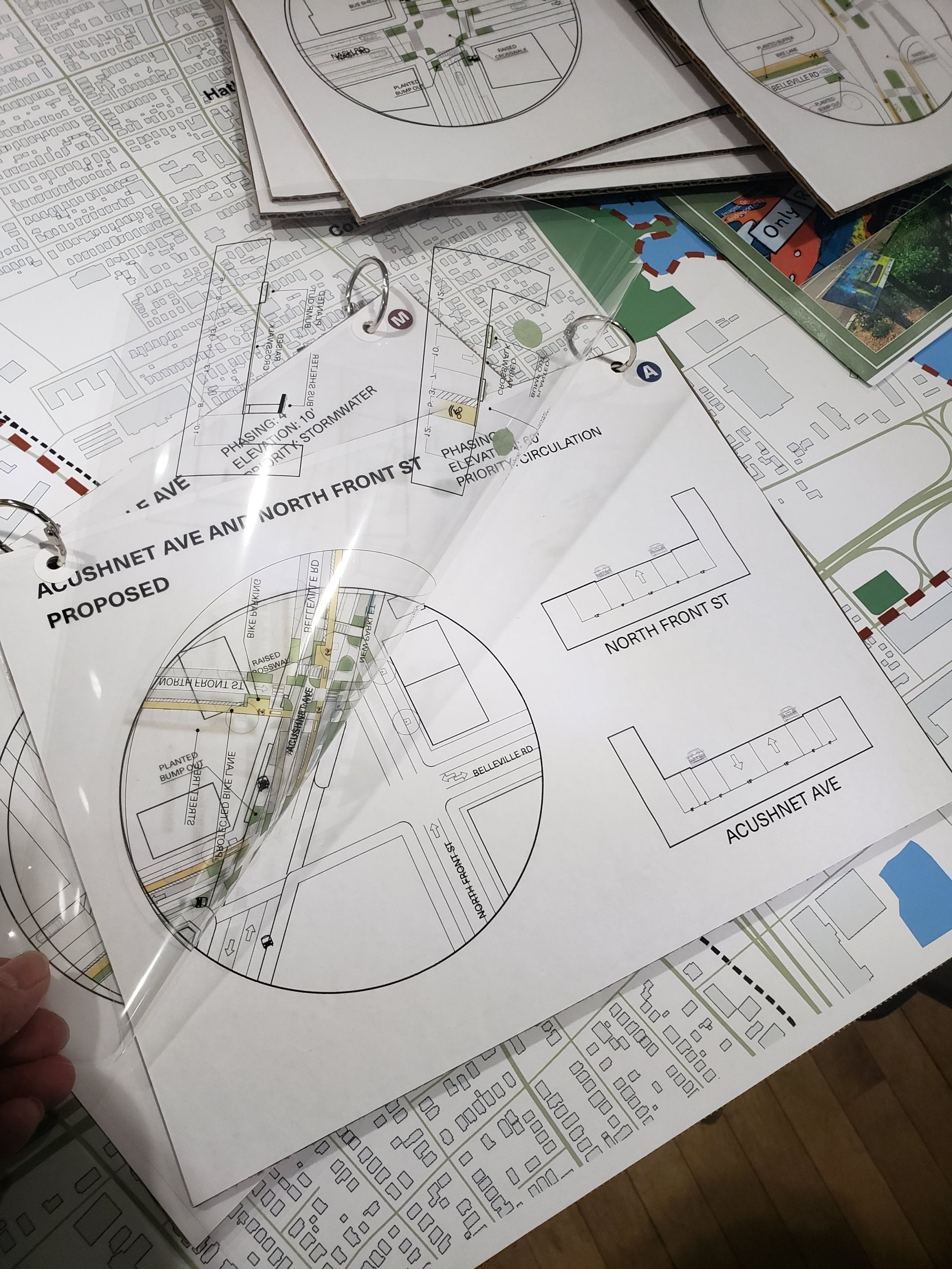Listening, Teamwork and the Power of Community Engagement
Northeastern students display and present their nearly finalized renderings and models in New Bedford's Fort Taber Community Center to local advisors who have guided the design process for the entire fall semester on Monday, December 4, 2023. Final reviews of the students' work will take place on December 11, 2023.By Charlotte Van Voorhis
On a chilly but clear Monday in December 2023, a bus pulled into the parking lot of the Fort Taber Community Center in New Bedford’s South End. The folks getting off the bus carried boxes with models, maps and handouts in them, setting all of these materials up on three long tables arranged inside the center. They were architecture, landscape architecture and urban planning students, at both the undergraduate and graduate level, participating in the third Envision Resilience Challenge. The students fell into three interdisciplinary student teams that had chosen a distinct section of New Bedford’s North End to study.
After a semester of researching, designing, meeting local advisors and listening to community feedback, the students were ready to present their almost-completed ideas and proposals to those community members who had introduced New Bedford to them and informed their design process.
“It was important to me that the students work in teams instead of individually to create a holistic and interdisciplinary approach to each of their selected sites within New Bedford’s North End,” said Northeastern Professor Sara Carr, the lead faculty on this design studio team. “In this group, we have architecture and landscape architecture students as well as urban planners. They have worked really well together, which does not always happen, and that has been a huge benefit to the studio.”
Sara, a participant in the first two iterations of the Envision Resilience Challenge, on Nantucket in 2021 and in Narragansett Bay in 2022, was not originally going to participate in the third year of the program, but circumstances miraculously coincided to fit it perfectly into her calendar.
“It was serendipitous that I had already made in-roads with community advisors at the National Park Service and Groundwork Southcoast before Envision Resilience announced they were going to be in New Bedford and Fairhaven this year. The support we’ve gotten from the Challenge has made the community engagement and iterative design process all the more fruitful for the students.”
The Envision Resilience Challenge was not entirely new to all of the Northeastern students when they started their semester.
“I got to listen to a couple of Speaker Series lectures in the past few years by getting the Zoom link from friends because I was so interested in the content,” said Graham Moitoso, a fifth-year undergraduate studying architecture at Northeastern. “Being in the studio, though, it’s very new and quite helpful to have a particular focus on a couple of topics in the Speaker Series even if it wasn’t always applicable to my project. Every lecture was super interesting to learn about.”
During Monday’s event, Sara broke the workshop into two 45-minute presentations, where community advisors mingled with two of the three student teams to hear their presentations and provide feedback as local stakeholders.
“We started three to four weeks ago in planning out everything we were going to do for this workshop,” said Graham. “In our group, we each had roles, I had project management and graphics, Rory was doing street design, Gloria did a lot of plant design and Kevin was doing the planning and policy side of it. We all figured out what we could contribute, set deadlines for ourselves and that worked really well.”
Graham’s classmates reflected on the impact of the Challenge, its Speaker Series, Resources and site visits, on their semester’s experience as a whole.
“As an architect, going through my academic career, I’ve been thinking a lot about what goes on inside of buildings and not necessarily what’s outside,” said Amy McAllister, a fifth-year architecture undergraduate student at Northeastern. “The Envision Resilience Challenge has let me explore climate change and all of the environmental systems that are impacting architecture on a larger scale. Interacting with community members is part of that because they’re the ones living with this change.”
Sol Tangvik, an Urban Planning graduate student one week away from completing her degree requirements, expressed a similar sentiment.
“The Envision Resilience Challenge semester has been a new and valuable experience in working with a real community as a client and experiencing real-life scenarios with architects and landscape architects,” she said. “I’m the only urban planner on my team and so I took on the role of presenter because, at the end of the day, we need to be able to sell ideas and stories, not just design.”
“The Envision Resilience Challenge has let me explore climate change and all of the environmental systems that are impacting architecture on a larger scale. Interacting with community members is part of that because they’re the ones living with this change.”
Sol’s parents were role models for her in community engagement and city design from a young age.
“I grew up knowing that if you want to see change in your home city, you can make that happen,” she said.
Sol hopes to bring this same attitude to her not-so-distant job search.
“This entire semester is going to make a wonderful story for the job interviews I’ll soon be conducting after graduation.”
Between sessions, the students discussed how the semester had been different from past semesters and design studios in their college and graduate school experiences:
“I think the Speaker Series was amazing, so many great people who are very smart and had so many things to introduce to us in a way that students could understand as well,” said Amy. “It wasn't too over my head. The community engagement side is all new to me, but everyone’s been super nice and with the Speaker Series session on community engagement, I learned so much. It was great across the board.”
“I really liked the first lecture on the area’s local history, Indigenous history and architectural urban history,” said Graham. “I’m a very curious person and it's hard to get that level of in-depth information in my own research. Plus, it’s hard to come into any situation and start designing without context so it was great to have that bridge into the site.”
The Northeastern students incorporated visual aids and interactive models into their presentations to make the experience more immersive and meaningful. The group that focused on the Acushnet Avenue neighborhood brought a nine-foot model of the avenue itself—these nine feet represented only half of the full model, which was too large to bring to this event. The team provided small pieces like trees, curb bump-outs and signs to encourage the advisors to imagine the Ave as they wished in real time. The group that focused on Riverside Park created a 3-D model of a free-spinning sign meant to call attention to elements of Wampanoag culture for all ages. The third group, in addition to colorful prints and posters of their design proposals, provided flipbooks showing their design site at present and with their proposals overlaid on the plans.
Adelsa Mendes, a community advisor and the TDI Fellow in New Bedford’s North End wrote notes on her handout to provide feedback and ideas.
“It’s just so refreshing and energizing to see how much work the students put into these design projects–they’re thinking comprehensively about the policies and funding required to make real and lasting positive change,” said Adelsa. “It fits so perfectly with the time New Bedford is in because for instance, TDI is looking for ways to use state funds in these communities and the students have already done a lot of work for us in preparing and visualizing creative ideas for Acushnet Avenue.”
After the workshop, the students packed up their models, designs and materials before getting on the bus to head back to Northeastern. The workshop was their last day of classes. Now, the students will spend the next week incorporating the notes received from the advisors into their designs and creating a final presentation to share with the Envision Resilience team, the other participating university teams and their jurors: leading practitioners in the fields of architecture, landscape architecture, urban planning and housing design, on Monday, December 11, 2023 which will mark the end of the third semester of the Envision Resilience Challenge.
Ethan de Aguiar, a community advisor and videographer for the 2023 Envision Resilience New Bedford and Fairhaven Challenge, who had quietly filmed the event and studied the designs thoughtfully, shared on Instagram, “I just wanted to say seeing their hard work come together and hearing them talk so passionately about a city some of them have only recently been introduced to has been extremely inspiring to me. Once again, I’m filled with pride to be from NBMA and blessed to be doing the work that I do.”
You can watch the final presentations on our Vimeo page–recordings will be available following the review.



